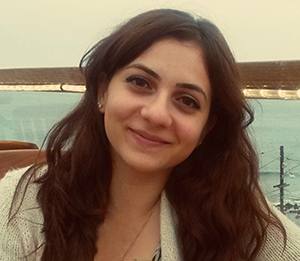
Roza Petrosyan
As a first year law student at the USC Gould School of Law, Roza Petrosyan has found that research is of the utmost importance.
“You have to figure things out on your own a lot, and research is very important,” she said. “I think when you come in with a background in research, history in research, you’re very analytical and very detailed.”
Luckily, Petrosyan had that background from her time interning at USC Shoah Foundation and doing research alongside Dr. Wolf Gruner, director of USC Shoah Foundation’s Center for Advanced Genocide Research.
Petrosyan, who received her B.A. in history, originally came to USC Shoah Foundation hoping to work with the Armenian Genocide testimony the Institute had just received.
“Growing up Armenian, I knew about it, and we had April 24 commemorations every year,” she said. “I was familiar with the history, and I had read a bunch of memoirs while in middle school and high school, but I hadn’t heard too much from my family.”
Though she didn’t talk to her family about it, Petrosyan was able to connect with survivor stories through watching testimony through the Visual History Archive.
“It was personal because it felt like these were my grandparents and great-grandparents because they look like your grandparents and they have the same mannerisms and the way they tell their stories,” she said. “It’s very personal to hear them talk about it and know this is very similar to what my great-grandparents probably went through.”
"[The Shoah Foundation] makes you feel like what you’re doing matters."
While interning for USC Shoah Foundation, Petrosyan also was able to conduct her own research on the Armenian Genocide under the advisement of Gruner. For her history honors thesis, she wrote a paper on Armenian women’s resistance during the genocide, for which she traveled to both Canada and Armenia to research.
It was these experiences, Petrosyan said, that got her interested in pursuing a career in human rights law.
“I wanted to continue on the human rights path, but I also wanted to work with survivors,” she said. “I’ve been applying to things for next year that are mostly human rights and will help me work with trafficking survivors and people who need help who have gone through trauma similar to genocide or some kind of mass violence.”
Though Petrosyan doesn’t know exactly where she’ll end up yet — she still has another two years of law school — she does know that USC Shoah Foundation has set high standards as a work place.
“Even though you’re doing very serious work and it can get depressing, everybody’s so nice and so upbeat; it creates a really good environment so the work that you do doesn’t pull you down,” she said. “It makes you feel like what you’re doing matters.”